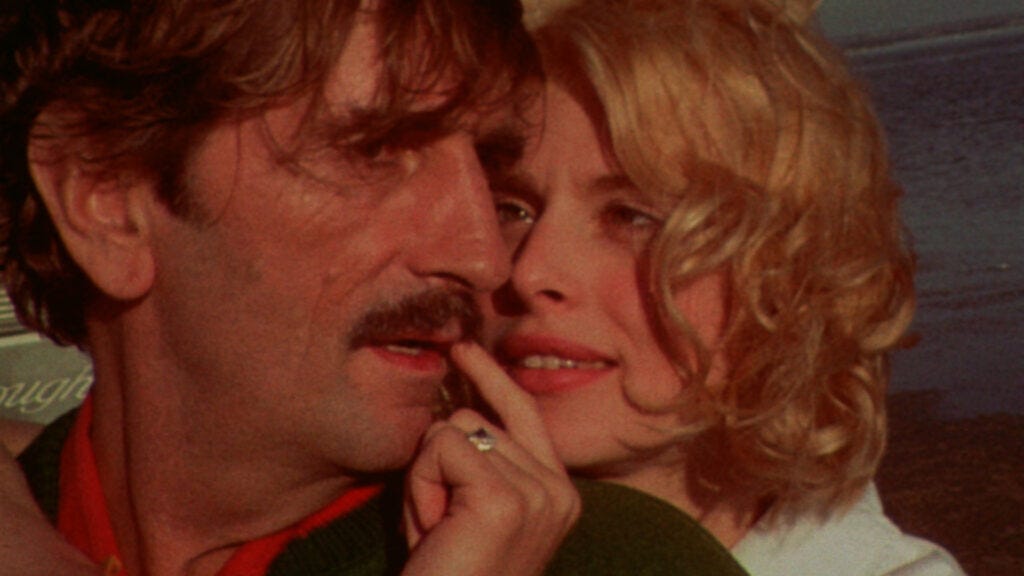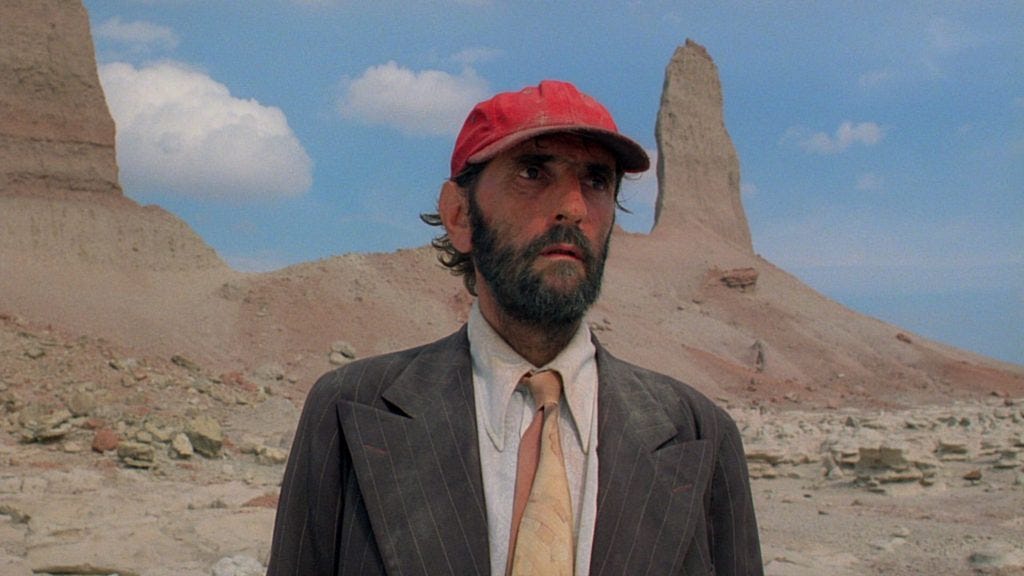Paris Texas: A Masterpiece About Wasted Time
Wim Wender's masterpiece is one of the most devastating pieces of film ever made, even forty years later.
Spoilers for Paris Texas if you have not watched the film before.
If I had to make a list of my favorite directors of all time, Wim Wenders would certainly be on that list. The way he is able to convey the human experience on screen with absolutely no gloss is something I aspire to do in my own work, but it’s much easier said than done. Last year, I was fortunate enough to see his latest film Perfect Days at the Toronto International Film Festival and not only was it one of my favorite films I saw at the festival and I believe it’s one of the best films of the decade thus far. Ever since I was so profoundly moved by the film, I have wanted to revisit Wim Wenders’ magnum opus Paris Texas. I watched the film my senior year of high school and enjoyed it at the time but I know I lived enough life since then that the film would resonate with me more now than it did then, and I was right.
This film recently celebrated it’s fortieth anniversary and got a 4k rerelease in some independent cinemas. Sadly, I wasn’t able to catch the film in theatres but hopefully one day I will get that chance, because I’m sure the experience is just encapsulating in a cinema. However, this is one of the few films that actually benefits the smaller screen as well. There is a certain vibe that is created when watching this film in your house late at night. It’s a reflective piece of filmmaking and while I’m sure it benefits from a communal watching experience, it also resonates as a quiet, reflective watch as well.
The movie stars Harry Dean Stanton as Travis Henderson, a man who has ran away from home for four years. His brother Walt, played by Dean Stockman gets a call saying they have found him in a disoriented state. Travis’ family has assumed he has been dead for all of this time and Walt gets more and more irritated when Travis doesn’t tell him where he’s been for all of these years. The film focuses on Travis reentering society, trying to reconnect with his son and finding his wife Jane.
This movie clocks in at a little under two and a half hours and the time is felt. This might sound like a negative criticism, but it isn’t. This film feels like taking an odyssey. While the movie is small in scope, cinematically it feels sprawling. We start with the same frustrations that Walt has and the same questions. Who is this man? Why isn’t he talking? Where has he been? Is he okay in the head? The film plays its cards slowly and meticulously and it’s not until about an hour into the film when you realize that Travis is hiding stuff he doesn’t want anyone to know. There’s a pain and regret in his eyes.
Travis’ son, Hunter, at first doesn’t want anything to do with him. Why would he? Travis ran off and abandoned him at a young age. He’s been raised by Walt and his wife, those are the parents that took him in. Hunter starts to take a curiosity and connection with his father after watching a super 8 film with old vacation videos on it with his father and mother in it. They look so happy and peaceful in the footage and for the first time as the audience, we also see a Travis that isn’t so stoic. We start to emphasize more for Travis as his son does as well, which is clever and economical storytelling at it’s finest.
When Travis decides to search for his wife Jane, Hunter wants to come along with him and see his biological mother again. Travis is at first against the idea but then decides that Hunter has the right to see his mother in person as well. This is a critique of the film some people will discuss after watching it. Travis is a terrible father. He should have left Hunter with his brother and wife who took care of him while he ran away. I agree wholeheartedly with this assessment, and I believe Wim Wenders does as well. This movie isn’t about what should happen in a moral sense, but what does happen in actuality. Travis discovers that his wife Jane is now working at a peep show. She is significantly younger than she is, probably somewhere in her mid twenties. This is when us the viewer start to understand - something here isn’t right.
In one of the films most understated but poignant scenes, Travis tells hunter a joke his father used to tell him. His father grew up in a place called Paris, a city in Texas. He would tell people that he grew up in Paris, and people would be more interested in whatever he had to say until he got to the punchline. He didn’t grow up in Paris France, but Paris Texas, an abandoned old town. I believe this perfectly encapsulates the theme of the entire film. At the start of the film, Travis remains mysterious in the eyes of the viewer. We don’t know his story, but we want to learn more. He’s a fascinating figure. The more we learn about him however, the more we see his flaws as a person and a father.
This all is perfectly captured when Travis finds Jane at the peep show and reveals to her who she is over the phone. He does a long monologue that several film aficionados, film professors and theatre teachers across the nation will agree is one of the best of all time. In this speech, he reveals the love that Jane and him once had, stating “even just going to the grocery store was an adventure”. It starts off as a gut wrenching story of unrequited love until it becomes much darker than that. Travis’ reveals his animosity towards Jane in their relationship and how attached he was to her. To the point where he become an alcoholic and would tie bells around her so she wouldn’t be able to escape at night. He even recounts a story where she got a sock to muffle the sound of the bell so she could escape, only for him to find her and tie her to the stove with his belt. He ran away after he woke up the next morning, the house set ablaze and Jane and Hunter were gone and had run away.
This reveal is one of the most devastating in film history. The rug is pulled out under the audience as they realize the protagonist they’ve been following is someone who was running away from the abuse they had caused. Paris France ended up looking more like Paris Texas after all. The smartest choice in this scene was the shift in focus. When the monologue starts, as Travis’ recounts the love he had for Jane the shot is focused on him on the other side of the glass in the peep show. When he starts to recount the abuse, the focus no longer is on him but is on Jane’s reaction to the story of abuse. Nastassja Kinski plays his wife Jane and she gives one of the most reflective performances I’ve ever seen on screen. The way she replays the memories in her head on screen as she cries on the other side of the peep show glass is one of the most powerful and provocative pieces of film I’ve ever seen. In this moment, we no longer follow Travis. We already know his story now. The POV switches to Jane as we want to see her find the escape she has so longed for all these years.
Travis’ reveals the address he left their son at so she can go see him again. In another powerful moment of the film, Jane walks in and sees her son in the hotel room Travis left him in and the two embrace - a longing connection is formed between the two. Travis drives off into the sunset, as lost as ever. This ending had some critics at the time scratching their heads. Everyone agrees, Travis’ brother and wife got the short end of the stick in this story. The boy they had been raising for the four years both parents ran off was taken away from them and reunited with his biological mother. Will his biological mother be a good mother to him? We don’t know. Ultimately, we like to fantasize an ending for the mother and son that feels like Paris France but are afraid will look more like Paris Texas. We hope that Jane heals from her trauma and is able to live a full life and her son is raised well, but who knows? That’s the frustrating aspect to the human experience, narrative is only written forwards and not backwards. Even with the wasted time in all of our lives, we can always rebuild for a better and stronger future.
Wim Wender’s evocative masterpiece dares the audience to sympathize. With waiting until two hours into the film to reveal Travis’ story, he dares makes the audience sympathize with a terrible person. As he drives off in the sunset, the realization is set he won’t get his happy ending. He also doesn’t deserve one, but maybe he can start anew and learn from his old ways. Or maybe he will continue to go down the path of self destruction. Yet, Wim Wenders decides pointedly to give the only semblance of a happy ending to Jane and her son Hunter, the victims of the situation. He shows that troubled paths are paved with revelation, even if they take their time to evolve. This is what makes Paris Texas resonate so pointedly, even forty years after the film’s initial release. It hasn’t aged a single day and the 4k restoration is beautiful. If you haven’t watched the film and still read to this point - it’s worth the watch. It’s a difficult watch at times but it’s one that is filled with delicate and genuine pathos. I believe it’s one of the single greatest films ever made.







